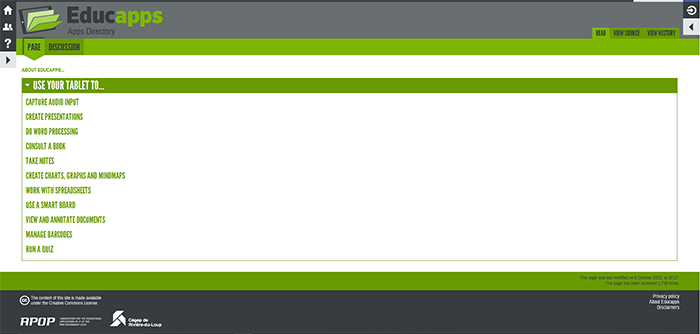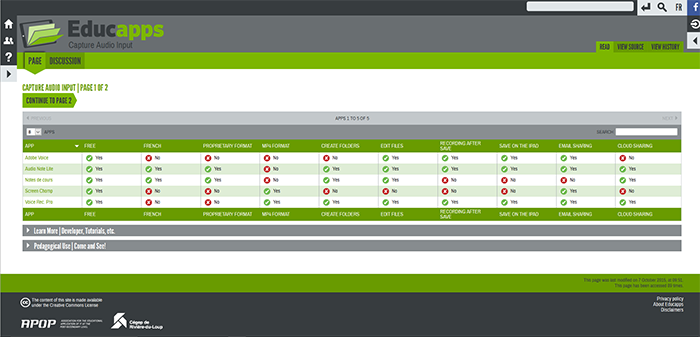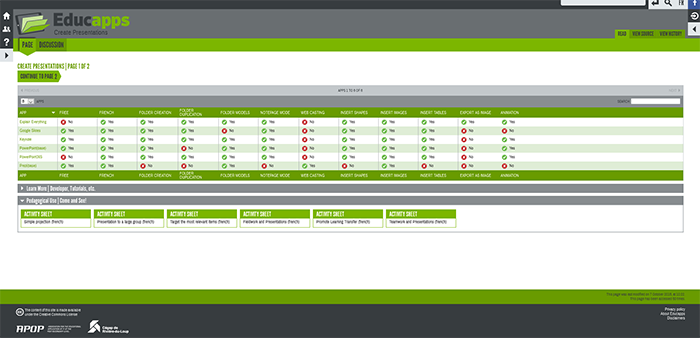Educapps: Educational Apps at Your Fingertips!
If you are one of those people that is still questioning the relevance of using technological devices within an educational context, or are preoccupied by how prevalent they have become, you would be hard-pressed not to admit that the technological disruption from these devices that has been predicted (virtual reality, artificial intelligence, robots, etc.) has indeed come to pass, as they are everywhere in our daily lives.
Of all of these technological devices, the one that symbolizes that we are all card-carrying members of this new world is, without a doubt, the smart phone or its big brother – the tablet. Of all the technological devices that have appeared in the last 20 years, the tablet certainly represents one of the most important advances in digital tools – and for good reason. Tablets are more than another new IT device, they have quite literally changed the way we work, and our relationship with information, notably paving the way for cloud computing, which has altered the way we design new computer applications.
According to CEFRIO (in French), the ‘average’ user had access to a handful of generalized and relatively complex pieces of software to use in the course of their work at the turn of the century. Today people have access to a wide range of rich applications adapted for use with a touch-screen interface. They are both very specialized and simple to use at the same time (optimized for the interface) … and accessible on the go!
As a consequence of simplifying applications, their number has multiplied. Apple’s App Store offers around 1.4 million applications for download. But how do you find your way in this vast ocean? Excellent question. Faced with such an abundance of choice, it is not unlikely to find many apps (often at free or low cost and designed for a specific need). How do you choose the right one? For the user, the availability of specific features often informs the decision on a specific choice of application, adapted to their needs.
It’s within this context that APOP (Association pour les applications pédagogiques de l’ordinateur au postsecondaire) and the Cégep de Rivière-du-Loup put Educapps, a directory of educational apps available for the iPad on-line.
The emergence of a number of tools and the wide range of possible uses of these for teaching and learning persuaded the Cégep de Rivière-du-Loup and APOP to make this directory, which documents the features, available to users and educational stakeholders.
Educapps (which is the English version of Éducapplis) went on-line during the fall semester of 2015 and is available to the general public, even if its content is intended for educational stakeholders. The apps are divided into large categories by type of use. For example:
- Capture audio input
- Create presentations
- Word processing
- Consult a book
- Take notes
- Concept mapping
- Create mind maps
- View and annotate documents
As it is also adapted for use on mobile devices, the Educapps interface provides for user-friendly and intuitive navigation. From the home page the user can access content related to each of the categories by making a selection from the horizontal menu.

The Educappshomepage
To facilitate the comparison of the main apps, each of the pages associated to a category of use contains a grid and tables that outline the available features and options for each of the apps.

Comparison tables in Educapps
The scope and educational potential associated with each category of applications is documented in the section “Pedagogical Use” which describes the uses for teaching and learning, providing examples of lesson plans provided by the site contributors, as appropriate.

Some lesson plans and other resources in Educapps
Evolving as the site contributors continue their experiments with the various apps, Educapps aims to document and identify the potential of applications available on the market based upon their use within the pedagogical context of higher education. The choice to deploy this resource on a wiki-based infrastructure was founded on the hypothesis that the different stakeholders and site contributors have the requisite expertise to merge and share the results of their research and experimentation, finding educational and technological solutions that are adapted to higher education. Educapps is the fruit of a constructive and iterative reflection – it is open and inclusive.
Would you like to get involved? Would you like to document an app that you have used on different types of tablets and mobile devices? Educapps welcomes your suggestions for new resources. Let’s work together!
To obtain some assistance to get started, please contact us at collaborateurs@educapplis.ca

